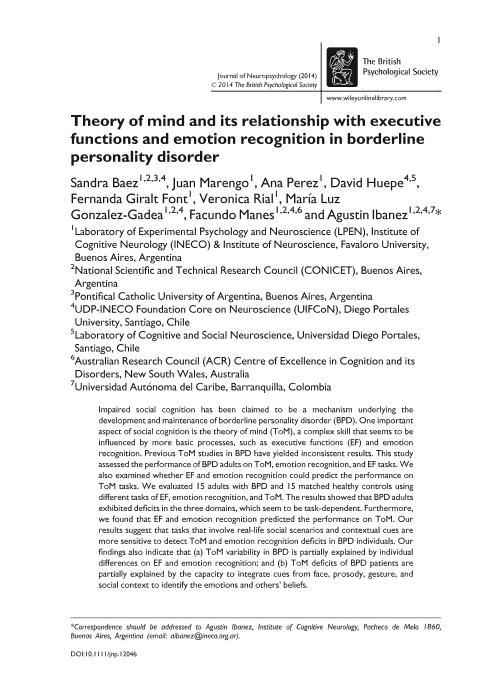Mostrar el registro sencillo del ítem
dc.contributor.author
Báez Buitrago, Sandra Jimena

dc.contributor.author
Marengo, Juan
dc.contributor.author
Perez, Ana
dc.contributor.author
Huepe, David
dc.contributor.author
Font, Fernanda Giralt
dc.contributor.author
Rial, Veronica
dc.contributor.author
González Gadea, María Luz

dc.contributor.author
Manes, Facundo Francisco

dc.contributor.author
Ibañez, Agustin Mariano

dc.date.available
2020-02-07T15:17:49Z
dc.date.issued
2015-09
dc.identifier.citation
Báez Buitrago, Sandra Jimena; Marengo, Juan; Perez, Ana; Huepe, David; Font, Fernanda Giralt; et al.; Theory of mind and its relationship with executive functions and emotion recognition in borderline personality disorder; British Psychological Soc; Journal Of Neuropsychology; 9; 2; 9-2015; 203-218
dc.identifier.issn
1748-6645
dc.identifier.uri
http://hdl.handle.net/11336/96859
dc.description.abstract
Impaired social cognition has been claimed to be a mechanism underlying the development and maintenance of borderline personality disorder (BPD). One important aspect of social cognition is the theory of mind (ToM), a complex skill that seems to be influenced by more basic processes, such as executive functions (EF) and emotion recognition. Previous ToM studies in BPD have yielded inconsistent results. This study assessed the performance of BPD adults on ToM, emotion recognition, and EF tasks. We also examined whether EF and emotion recognition could predict the performance on ToM tasks. We evaluated 15 adults with BPD and 15 matched healthy controls using different tasks of EF, emotion recognition, and ToM. The results showed that BPD adults exhibited deficits in the three domains, which seem to be task-dependent. Furthermore, we found that EF and emotion recognition predicted the performance on ToM. Our results suggest that tasks that involve real-life social scenarios and contextual cues are more sensitive to detect ToM and emotion recognition deficits in BPD individuals. Our findings also indicate that (a) ToM variability in BPD is partially explained by individual differences on EF and emotion recognition; and (b) ToM deficits of BPD patients are partially explained by the capacity to integrate cues from face, prosody, gesture, and social context to identify the emotions and others' beliefs.
dc.format
application/pdf
dc.language.iso
eng
dc.publisher
British Psychological Soc

dc.rights
info:eu-repo/semantics/openAccess
dc.rights.uri
https://creativecommons.org/licenses/by-nc-sa/2.5/ar/
dc.subject
BORDERLINE PERSONALITY DISORDER
dc.subject
EMOTION RECOGNITION
dc.subject
EXECUTIVE FUNCTIONS
dc.subject
THEORY OF MIND
dc.subject.classification
Otras Psicología

dc.subject.classification
Psicología

dc.subject.classification
CIENCIAS SOCIALES

dc.title
Theory of mind and its relationship with executive functions and emotion recognition in borderline personality disorder
dc.type
info:eu-repo/semantics/article
dc.type
info:ar-repo/semantics/artículo
dc.type
info:eu-repo/semantics/publishedVersion
dc.date.updated
2019-10-28T14:29:25Z
dc.journal.volume
9
dc.journal.number
2
dc.journal.pagination
203-218
dc.journal.pais
Reino Unido

dc.description.fil
Fil: Báez Buitrago, Sandra Jimena. Consejo Nacional de Investigaciones Científicas y Técnicas. Oficina de Coordinación Administrativa Houssay. Instituto de Neurociencia Cognitiva. Fundación Favaloro. Instituto de Neurociencia Cognitiva; Argentina
dc.description.fil
Fil: Marengo, Juan Manuel. Consejo Nacional de Investigaciones Científicas y Técnicas. Oficina de Coordinación Administrativa Houssay. Instituto de Neurociencia Cognitiva. Fundación Favaloro. Instituto de Neurociencia Cognitiva; Argentina
dc.description.fil
Fil: Perez, Ana.
dc.description.fil
Fil: Huepe, David. Universidad Diego Portales; Chile
dc.description.fil
Fil: Giralt Font, Fernanda.
dc.description.fil
Fil: Rial, Veronica.
dc.description.fil
Fil: González Gadea, María Luz.
dc.description.fil
Fil: Manes, Facundo Francisco. Consejo Nacional de Investigaciones Científicas y Técnicas. Oficina de Coordinación Administrativa Houssay. Instituto de Neurociencia Cognitiva. Fundación Favaloro. Instituto de Neurociencia Cognitiva; Argentina. Universidad Diego Portales; Chile
dc.description.fil
Fil: Ibáñez Barassi, Agustín Mariano. Consejo Nacional de Investigaciones Científicas y Técnicas. Oficina de Coordinación Administrativa Houssay. Instituto de Neurociencia Cognitiva. Fundación Favaloro. Instituto de Neurociencia Cognitiva; Argentina
dc.journal.title
Journal Of Neuropsychology

dc.relation.alternativeid
info:eu-repo/semantics/altIdentifier/doi/http://dx.doi.org/10.1111/jnp.12046
dc.relation.alternativeid
info:eu-repo/semantics/altIdentifier/url/https://onlinelibrary.wiley.com/doi/abs/10.1111/jnp.12046
Archivos asociados
